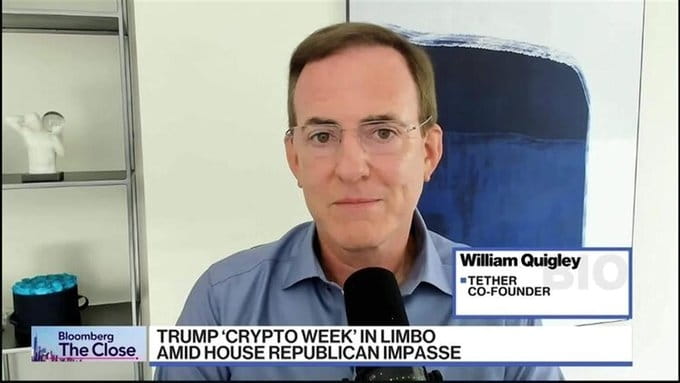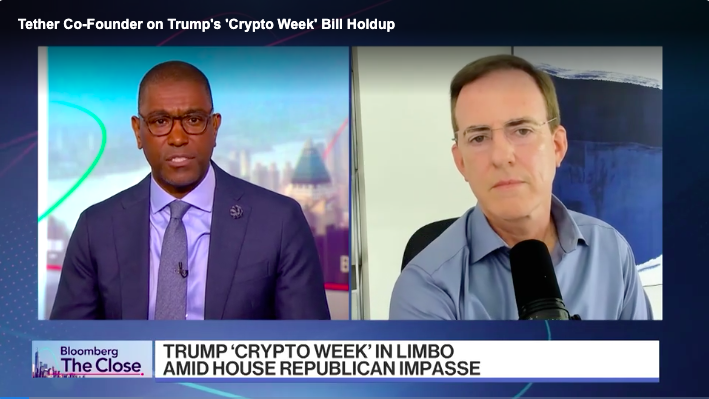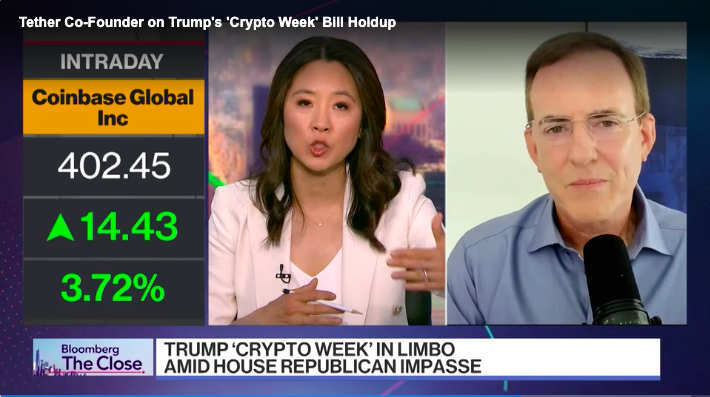
Note: The original video is from Bloomberg, published on July 17, 2025, Beijing time!
William Quigley, co-founder of Tether and Worldwide Asset Exchange, shared his views on cryptocurrency legislation and future prospects. He discussed this with host Romaine Bostick and Scarlet Fu on Bloomberg's The Close.
Romaine Bostick: I know that we are currently closely monitoring three bills being reviewed by Congress. However, prior to this, there has been a sense of optimism in the cryptocurrency space, mainly because the industry seems to have support from Washington.
William Quigley: Indeed. The situation has changed dramatically compared to a year ago, or even six months ago. In the past six months, we have made more legislative progress than in the first fifteen years since Bitcoin's inception. Among these, the most likely bill to be signed soon is the Genius Act, which establishes a framework for companies wishing to issue stablecoins, a very important part of the cryptocurrency space. Additionally, there are two other bills in the House, one of which I think is extremely important—the Clarity Act. The Clarity Act establishes a framework for how the U.S. government and all its agencies view cryptocurrencies. Those of us in this market have long yearned for such a bill. The Clarity Act is quite good, and if you look at their definitions of some obscure technical issues, you will find they have done quite well. Clearly, there will be a vote tomorrow on the three bills, including the Genius Act, which has already been approved by the Senate, and the other two bills that are still in the House. Those bills still need to be submitted to the Senate for review, but the situation looks good.

Romaine Bostick: But I'm curious about that third bill, which would actually prevent the Federal Reserve or any government agency from issuing its own digital dollar. This seems to be the crux of the matter. I mean, some people want to include this provision in other bills. Do you support or oppose this provision?
William Quigley: Well, many people in the cryptocurrency space might find my views on this issue a bit strange, but I do not oppose central banks encrypting their fiat currencies and creating central bank digital currencies. I have long believed that within the next decade, all major economies in the world will encrypt their currencies and transition to tradable encrypted assets. I think this is inevitable, as it is a better way to transmit money. Tether has initiated this process, and now many other companies are launching stablecoins. I don’t understand why the government doesn’t want to do this. What people are worried about is that the government will know every move you make with your funds. But I want to tell everyone that the government already knows all your financial movements.
Scarlet Fu: This is explosive news. Many people are talking about this bill and the need for legislation to keep pace with innovation to ensure that the dollar remains competitive in the digital world. In what areas is regulation still far behind innovation? If this is the direction we are striving for, then innovation is still outpacing regulation. In what areas is this gap most evident?

William Quigley: There are two obvious issues. One is the legislative ambiguity over which federal agency in the U.S. has the highest regulatory authority over cryptocurrencies. The Clarity Act states that it should be the Commodity Futures Trading Commission (CFTC), and I support this. It should not be the Securities and Exchange Commission (SEC), as the SEC has performed poorly in this regard; they are trying to regulate through litigation, but I don't think that has been effective. Therefore, this is an area where we still lack a strict definition. Another area is the distinction between cryptocurrencies and securities, which the Clarity Act addresses. Additionally, there is the issue of banks' willingness to collaborate with cryptocurrency companies. Banks still have many issues and are reluctant to work with cryptocurrency companies, which I believe is because they are concerned about facing competition.
*Friendly Reminder: This article is for educational purposes only and does not constitute any investment advice!
